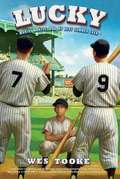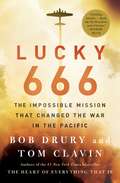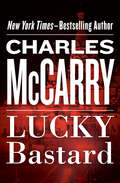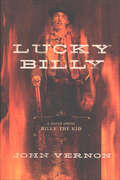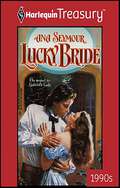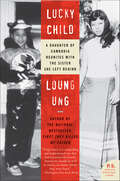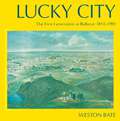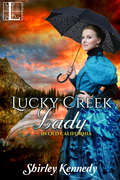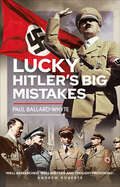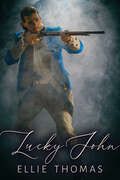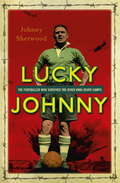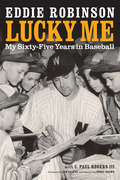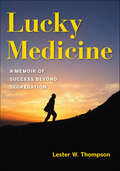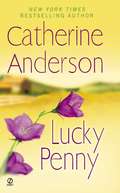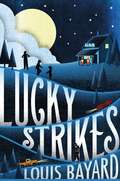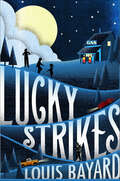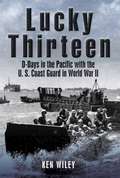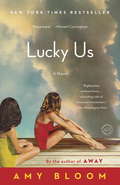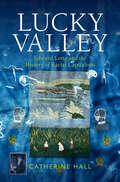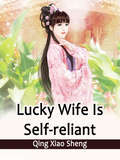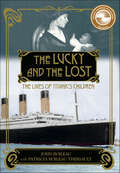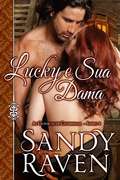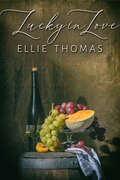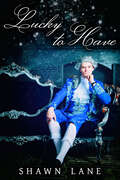- Table View
- List View
Lucky
by Wes TookeLouis isn't very good at playing baseball, but he knows and loves the game more than anybody. He loves the purity of the sport, the sound of the crack of a bat, and the smell of freshly cut grass in the stadium. And more than anything, he loves the New York Yankees. So when he becomes a bat boy for the team during the summer of 1961, it is a dream come true. Lucky gives readers baseline box seats to one of the most memorable seasons in sports history, and as Mickey Mantle and Roger Maris compete in their legendary home-run race, Louis learns that the heroes he looks up to can teach him life lessons that will change him forever.
Lucky 666: The Impossible Mission
by Bob Drury Tom Clavin&“A fast-paced, well-researched…irresistible&” (USA TODAY) World War II aviation account of friendship, heroism, and sacrifice that reads like Unbroken meets The Dirty Dozen from the authors of the #1 New York Times bestselling The Heart of Everything That Is.It&’s 1942, just after the blow to Pearl Harbor and the Japanese invasion of the Philippines, and the United States is reeling. A group of raw US Army Airmen travels to the embattled American Air Base of Port Moresby at Papua, New Guinea. Their mission: to protect Australia, to disrupt the Japanese supply lines, and to fly perilous reconnaissance runs over the enemy-held strongholds. Among the men are pilot Captain Jay Zeamer and bombardier Sergeant Raymond Joseph &“Joe&” Sarnoski, a pair of swashbuckling screw-ups whose antics prevent them from being assigned to a regular bombing crew. Instead, they rebuild a broken-down B-17 bomber from spare parts and christen the plane Old 666. One day in June 1943, a request is circulated: volunteers are needed for a reconnaissance flight into the heart of the Japanese empire. Zeamer and Sarnoski see it as a shot at redemption and cobble together a crew and depart in Old 666 under cover of darkness. Five hours later, dozens of Japanese Zeros riddle the plane with bullets. Bloody and half-conscious, Zeamer and Sarnoski keep the plane in the air, winning what will go down as the longest dogfight in history and maneuvering an emergency landing in the jungle. Only one of them will make it home alive. With unprecedented access to the Old 666 crew&’s family and letters, as well as newly released transcripts from the Imperial Air Force&’s official accounts of the battle, Lucky 666 is perhaps the last untold &“great war story&” (Kirkus Reviews) from the war in the Pacific. It&’s an unforgettable tale of friendship, bravery, and sacrifice—and &“highly recommended for WWII and aviation history buffs alike&” (BookPage).
Lucky Bastard: A Novel
by Charles McCarryThe KGB grooms a long-lost Kennedy for an explosive assignment in this thriller by an ex-CIA agent and New York Times–bestselling spy novelist. Although in the mid-1940s no one had ever heard of JFK, Jack Adams&’s mother insisted her new son be christened John Fitzgerald. Years after his parents&’ death, Jack learns the reason for his name: a packet of photos showing his mother in bed with young John Kennedy. As a student at Columbia University, Jack demonstrates that he inherited more than JFK&’s good looks. His irresistible charisma and political instinct make him a natural campus leader, but he has his sights set on something bigger than the student council. Young Jack Adams wants to be president of the United States, and the Soviet Union is prepared to help. A KGB spy named Dmitri recruits Jack, promising him the presidency in exchange for treason. Dmitri guides Jack for decades, putting him in a position to become the largest intelligence coup in history—unless the candidate&’s libido derails him first.
Lucky Billy: A Novel About Billy the Kid
by Susan Wyler John VernonA myth-busting novel about America’s most infamous and beloved outlaw, Billy the Kid, from a critically acclaimed historical novelistAccording to legend, Billy the Kid killed twenty-one men, one for every year of his short life; stole from wealthy cattle barons to give to the poor; and wooed just about every senorita in the American Southwest.In Lucky Billy, John Vernon digs deeply into the historical record to find a truth more remarkable than the legend, and draws a fresh, nuanced portrait of this outlaw’s dramatic and violent life.Billy the Kid met his celebrated end at the hands of Pat Garrett, his one-time carousing partner turned sheriff, who tracked Billy down after the jail break that made him famous. In Vernon’s telling, the crucial event of Billy’s life was the Lincoln County War, a conflict between a ring of Irishmen in control of Lincoln, New Mexico, and a newcomer from England, John Tunstall, who wanted to break their grip on the town. Billy signed on with Tunstall. The conflict spun out of control with Tunstall’s murder, and in a series of revenge killings, an obscure hired gunman called Kid Antrim became Billy the Kid.Besides a full complement of gunfights, jail breaks, and bawdy behavior, Lucky Billy is a provocative picture of the West at a critical juncture between old and new. It is also a portrait of an American icon made human, caught in the middle, more lost than brave, more nadve than principled, more of an accidental survivor than simply the cold-blooded killer of American myth.
Lucky Bride
by Ana SeymourParker Prescott had no intention of ever settling down, but Molly Hanks was the kind of woman who could stop a man in his tracks-with or without her buffalo gun!Molly knew a smooth-talking drifter when she saw one. A man with charm like that was dangerous. And she had better things to do than keep an eye on some silly cowboy.
Lucky Child: A Daughter of Cambodia Reunites with the Sister She Left Behind (P. S. Ser.)
by Loung UngAfter enduring years of hunger, deprivation, and devastating loss at the hands of the Khmer Rouge, ten-year-old Loung Ung became the "lucky child," the sibling chosen to accompany her eldest brother to America while her one surviving sister and two brothers remained behind. In this poignant and elegiac memoir, Loung recalls her assimilation into an unfamiliar new culture while struggling to overcome dogged memories of violence and the deep scars of war. In alternating chapters, she gives voice to Chou, the beloved older sister whose life in war-torn Cambodia so easily could have been hers. Highlighting the harsh realities of chance and circumstance in times of war as well as in times of peace, Lucky Child is ultimately a testament to the resilience of the human spirit and to the salvaging strength of family bonds.
Lucky City: The First Generation at Ballarat: 1851-1901
by Weston BateBallarat was not a typical goldfield. There was little surface alluvial gold and, in a tantalising search for fabulous underground river beds the, the youthful migrants of the 1850s overcame immense obstacles. They were both thrifty and speculative, using the profits of one bonanza to pursue another—and were probably goaded by officialdom into the famous Eureka rebellion of 1854. Weston Bate explores the interaction of man with the environment. He sees Ballarat's pioneers as heroic adventurers. And he shows how a makeshift boom town matured into Golden City, City of Gardens, City of Sculptures. Lucky City tells how pastoral, agricultural, timber-milling and mining activity sustained a regional marketplace and industrial centre. It looks at the spread of Ballarat's influence across the country, and charts its rivalry with Bendigo and its resentment of Melbourne's interference. This is the lively story of an immigrant community. Its focus is human, its writing clear and engaging, and its wonderful collection of illustrations covers the whole panorama of Ballarat life.
Lucky Creek Lady (In Old California #3)
by Shirley KennedyPampered, fun-loving Laurie Sinclair hates everything about the rough, ugly mining town of Lucky Creek, California. She only left Philadelphia because her wealthy father opened the Monarch Gold Mine—and because Brandon, the man she’d hoped to marry, sent her away. But when Brandon changes his mind, she’s ready to pack her bags—until her father is suddenly killed in a mine explosion, and her brother is badly injured . . . As troubles mount for the Sinclairs, including a ruinous unexpected debt, they save themselves by selling half their mine ownership to Darcy McKenna, a friend of Laurie’s late father. Brusque and brooding, Darcy is the opposite of exuberant Laurie. Yet as Laurie stays on to help him in the office, Darcy soon finds himself smiling and happier, while Laurie finds her interests are changing. She might even be falling for Darcy. But her heart won’t truly be tested until Brandon shows up—and throws her life into chaos . . . Praise for Shirley Kennedy and her novels “The historical details are vivid and realistic and should appeal to fans of the historical romance genre. The characters are interesting, the story is engaging, and the romance is slow-building and sweet. River Queen Rose is a great start in what looks to be a promising historical series by Kennedy.” —RT Book Reviews, 4 Stars “Shirley Kennedy spins a tale sure to pull at the heartstrings of her readers.” —RT Book Reviews on Three Wishes for Miss Winthrop, 4 stars
Lucky Hitler's Big Mistakes
by Paul Ballard-WhyteAdolf Hitler’s Great War military experiences in no way qualified him for supreme command. Yet by July 1940, under his personal leadership the Third Reich’s armed forces had defeated Poland, Czechoslovakia, Holland, Denmark, Norway, Belgium and France. The invasion of Great Britain was a distinct reality following Dunkirk. Hungary, Bulgaria and Romania had become allies along with the acquiescent military powers of Mussolini’s Italy and Franco’s Spain. These achievements prompted Field Marshal Willem Keitel, the Wehrmacht’s Chief of Staff, to pronounce Hitler to be ‘the Greatest Commander of all time’. Storm clouds were gathering, most notably the disastrous decision to tear up the treaty with the Soviet Union and launch Operation Barbarossa in 1941. As described in this meticulously researched and highly readable book, Hitler’s blind ideology, racist hatred and single-mindedness led him and his allies inexorably to devastating defeat. How far was it good luck that gave Hitler his sensational early political and military successes? Certainly fortune played a major role in his survival from many assassination attempts and sex scandals. The author concludes, from 1941 onwards, the Fuhrer’s downfall was entirely attributable to military misjudgments that he alone made. Lucky: Hitler’s Big Mistakes exposes the enigmatic Dictator for what he really was – incredibly lucky and militarily incompetent.
Lucky John
by Ellie ThomasOwen Montgomery has been a landless drifter since the Royalist defeat at the Battle of Worcester nine years previously when he was seventeen. Since then, he has lingered abroad as an insignificant follower in the retinue of exiled King Charles.In the spring of 1660, Owen travels across England as an envoy on behalf of the King. Despite this important diplomatic mission, Owen regards himself as little better than the highwaymen he encounters on the lawless roads.During a brief stop at an obscure roadside inn, he encounters Lucky John, a bullied skivvy with a sweet nature who makes a lasting impression. When Owen impulsively rescues John from his unkind employer, he has no idea of the impact the lad will make on his lonely existence.Will Owen reject this chance to open up and share his life? And can Owen be convinced he deserves John’s love?
Lucky Johnny: The Footballer who Survived the River Kwai Death Camps
by Johnny SherwoodIn 1938 Johnny Sherwood was a young professional footballer on the brink of an England career, touring the world with the all-star British team the Islington Corinthians. By 1942 he was a soldier surrendering to the Japanese at the siege of Singapore. Taken prisoner he was sent to a POW camp deep in the heart of the Thai jungle, where he was starved, beaten, and forced to build the notorious 'railway of death' on the River Kwai. Johnny kept his and his men's spirits up with tales of his footballing past, even organising matches until he and the other prisoners became too weak to play. One day, he even encountered a brutal Japanese guard, and was shocked to recognise him as a Japanese footballer Johnny had played against. Many years after Johnny's death, his grandson Michael discovered an old manuscript hidden in the attic of his mother's house. It was Johnny's own account of his wartime experiences - the story too horrific to reveal in full to his loved ones. In the tradition of bestselling memoirs like The Railway Man, Lucky Johnny is an inspirational tale of survival against the odds.
Lucky Johnny: The Footballer who Survived the River Kwai Death Camps
by Johnny SherwoodIn 1938 Johnny Sherwood was a young professional footballer on the brink of an England career, touring the world with the all-star British team the Islington Corinthians. By 1942 he was a soldier defending Singapore against the Japanese. Taken prisoner he was sent to a POW camp deep in the heart of the Thai jungle, where he was starved, beaten, and forced to build the notorious 'railway of death' on the River Kwai. Johnny kept his and his men's spirits up with tales of his footballing past, even organising matches until he and the other prisoners became too weak to play. One day, he encountered a brutal Japanese guard, and was shocked to recognise him as a Japanese footballer Johnny had played against. Despite the inhumane treatment he received at the hands of the guards, and the trials the POWs continued to face even after liberation, Johnny's story is an inspirational tale of survival against the odds. Many years after Johnny's death, his grandson Michael discovered an old manuscript hidden in the attic of his mother's house. It was Johnny's own account of his wartime experiences - the story too horrific to reveal to his loved ones. Now, in publishing Johnny's memoirs, Michael is finally fulfilling Johnny's wish that the world should know the truth about his traumatic time as a POW, and his long journey back to civilisation.
Lucky Me: My Sixty-Five Years in Baseball
by Eddie Robinson C. Paul RogersEddie Robinson&’s career lasted sixty-five years and spanned the era before and during World War II, integration, the organization of the players union, expansion, use of artificial turf, free agency, labor stoppages, and even the steroid era. He was a Minor League player, a Major League player, a coach, a farm director, a general manager, a scout, and a consultant. During his six and a half decades in baseball, he knew, played with or against, or worked for or with many of baseball&’s greats, including Hank Aaron, Yogi Berra, Joe DiMaggio, Bob Feller, Rogers Hornsby, Mickey Mantle, Satchel Paige, Jackie Robinson, Babe Ruth, Tris Speaker, George Steinbrenner, Casey Stengel, Bill Veeck, and Ted Williams. The lively autobiography of Robinson, Lucky Me highlights a career that touched all aspects of the game from player to coach to front-office executive and scout. In it Robinson reveals for the first time that the 1948 Cleveland Indians stole the opposition&’s signs with the use of a telescope in their drive to the pennant. This edition features a new afterword by C. Paul Rogers III.
Lucky Medicine: A Memoir of Success beyond Segregation (Well House Bks.)
by Lester W. ThompsonA remarkable, personal glimpse of Black student life at Indiana University in the early 1960s. In 1961, a skinny African American boy from Indianapolis arrived at Indiana University Bloomington determined to become a doctor. For the next three years, Lester Thompson kept a detailed, intimate diary of his journey to graduation. In Lucky Medicine, Lester returns to his long-ago journal and, with honesty, humor, and a healthy dose of rueful self-reflection, shares stories from his college years at Indiana University. Fascinating glimpses emerge of Black Greek life at the time, including the building of the Kappa Alpha Psi fraternity house and the successes, struggles, and social lives of its members. Lester's student years were driven by hard work, but also bustled with fun and drama. He recalls his time studying at the university library, falling in and out of love many times, becoming friends with fellow fraternity brother Booker T. Jones, a truly memorable invitation extended to meet with George Wallace, and an epic, no-holds-barred brawl with limestone cutters at the 24-Hour Grill. Lucky Medicine offers a closeup, unforgettable look at IU student life just before the sweeping social changes of the 1960s, when students of color accounted for less than 2 percent of the Indiana University's student body.
Lucky Penny
by Catherine AndersonTo support her orphaned niece, impoverished Brianna O'Keefe accepts work with a Colorado rancher. To guard herself from unwanted attention, she resorts to a harmless little lie: that she's married to a Denver gold miner named David Paxton. But when her "husband" shows up, Brianna is stunned--not the least by her desire. . .
Lucky Strikes
by Louis BayardWith her mama recently dead and her pa sight unseen since birth, fourteen-year-old Amelia is suddenly in charge of her younger brother and sister--and of the family gas station. Harley Blevins, local king and emperor of Standard Oil, is in hot pursuit to clinch his fuel monopoly. To keep him at bay and keep her family out of foster care, Melia must come up with a father--and fast. And so when a hobo rolls out of a passing truck, Melia grabs opportunity by its beard. Can she hold off the hounds till she comes of age?
Lucky Strikes
by Louis BayardWith her mama recently dead and her pa sight unseen since birth, fourteen-year-old Amelia is suddenly in charge of her younger brother and sister--and of the family gas station. Harley Blevins, local king and emperor of Standard Oil, is in hot pursuit to clinch his fuel monopoly. To keep him at bay and keep her family out of foster care, Melia must come up with a father--and fast. And so when a hobo rolls out of a passing truck, Melia grabs opportunity by its beard. Can she hold off the hounds till she comes of age?
Lucky Thirteen: D-Days in the Pacific with the U. S. Coast Guard in World War II
by Ken WileyThis story is about the U .S. Coast Guard's role in World War II, as told from the perspective of a teenage boy who played a part in that great global struggle. It is also about an unheralded boat that played an insignificant and yet very important role in America's response to restoring freedom to a part of the world enslaved by an evil tyranny. Lucky 13--my boat--was a weapon specifically designed and mass produced in the United States to bridge the 6,000-mile ocean gap and carry the war to the shores of the enemy. The "Higgins" boats were lowered from troop ships with one mission: to carry the infantry and equipment the last seven miles of the long and perilous journey onto the beaches of enemy-held islands.
Lucky Us
by Amy BloomLucky Us is a brilliantly written, deeply moving, fantastically funny novel of love, heartbreak, and luck. Disappointed by their families, Iris, the hopeful star and Eva the sidekick, journey through 1940s America in search of fame and fortune. Iris's ambitions take the pair across the America of Reinvention in a stolen station wagon, from small-town Ohio to an unexpected and sensuous Hollywood, and to the jazz clubs and golden mansions of Long Island. With their friends in high and low places, Iris and Eva stumble and shine though a landscape of big dreams, scandals, betrayals, and war. Filled with gorgeous writing, memorable characters, and surprising events, Lucky Us is a thrilling and resonant novel about success and failure, good luck and bad, the creation of a family, and the pleasures and inevitable perils of family life, conventional and otherwise. From Brooklyn's beauty parlors to London's West End, a group of unforgettable people love, lie, cheat and survive in this story of our fragile, absurd, heroic species.
Lucky Valley: Edward Long and the History of Racial Capitalism (Critical Perspectives on Empire)
by Catherine HallWhy does Edward Long's History of Jamaica matter? Written in 1774, Long's History, that most 'civilised' of documents, attempted to define White and Black as essentially different and unequal. Long deployed natural history and social theory, carefully mapping the island, and drawing on poetry and engravings, in his efforts to establish a clear and fixed racialized hierarchy. His White family sat at the heart of Jamaican planter society and the West India trade in sugar, which provided the economic bedrock of this eighteenth-century system of racial capitalism. Catherine Hall tells the story behind the History of a slave-owning family that prospered across generations together with the destruction of such possibilities for enslaved people. She unpicks the many contradictions in Long's thinking, exposing the insidious myths and stereotypes that have poisoned social relations over generations and allowed reconfigured forms of racial difference and racial capitalism to live on in contemporary societies.
Lucky Wife Is Self-reliant: Volume 1 (Volume 1 #1)
by Qing XiaoShengThe underworld girl crossed over to become the abandoned daughter of an ancient family.In the face of the cruel stepmother, the heart of the white lotus sister,She got up, slapped her stepmother in the face, and lifted the veil of her false sister.Take control of the family, open a chain of supermarkets, establish a base for the production of crops, become the main suppliers of the royal family, aristocratic families.Emma, what's going on with this stubborn man behind me?He even said that they were fated to be in the womb …Could she not? So many beautiful men were waiting in line …
Lucky and the Lost: The Lives of Titanic’s Children
by John BoileauMore than half the children aboard Titanic died in the sinking, calling into question the notion of “women and children first.” In The Lucky and the Lost: The Lives of Titanic’s Children, historian John Boileau tells the stories of the children who fortunately escaped in lifeboats and those who tragically did not. It also examines the heart-breaking circumstances of the victims’ deaths as well as the fascinating stories of survivors’ lives. Uniquely, The Lucky and the Lost tells the stories of ten yet-unborn children whose mothers survived to give birth. This includes the children of Madeleine Astor, wife of John Jacob Astor—the richest man to perish in the disaster—and Juliette Laroche, wife of Joseph Laroche, the only Black man onboard, as well as the stories of twenty-three Lebanese children onboard, another largely unknown feature of the disaster. The Lucky and the Lost includes compelling stories of survivors in later life (an aspect not included in most Titanic books) and the lasting effect the sinking had on them. With forty black-and-white images as well as numerous maps and illustrations, The Lucky and the Lost offers the most complete accounting to date of the fates of the children aboard the doomed ocean liner.
Lucky e Sua Dama
by Sandy RavenQuando Mary-Michael Watkins se casou com o seu idoso mentor, dono do estaleiro onde ela trabalhava, nunca imaginou que
Lucky in Love
by Ellie ThomasSequel to Lucky JohnAfter years of exile during Commonwealth rule following the English Civil Wars, Owen Montgomery is home to stay in his Monmouthshire with John, the rescued kitchen lad who has become the light of Owen’s life.Owen has enjoyed eighteen months of peace since his tenure as an official envoy on behalf of King Charles II. In the autumn of 1661, Owen is torn from his comfortable life by a summons from his brother Lewis, a courtier close to the king. Owen is reluctant to take John to London, concerned about the impact of corruption and temptations of court life on such a well-meaning innocent. But how can he refuse John anything?Owen reluctantly fulfils his duty to his brother while John gets to grips with the palace and its hazards. Can Owen continue to protect John from harm? Or might his constant vigilance stifle the man he loves?
Lucky to Have
by Shawn LaneIn 1773, Lord Michael Haverly, third son of a marquis, is pressured to make a suitable match. But Michael has a secret -- he prefers men. He doesn’t want a wife. Then the wealthy daughter of a merchant proposes a marriage of convenience for them both, and Michael accepts.Five years later, Michael is a widower with a young daughter and the unexpected freedom to live how he has always wanted.George Jenks is the new valet to Lord Michael. George also prefers men, and when George offers a grief-stricken Michael comfort, their mutual attraction turns to passion and eventually love. One they both realize they are lucky to have.
